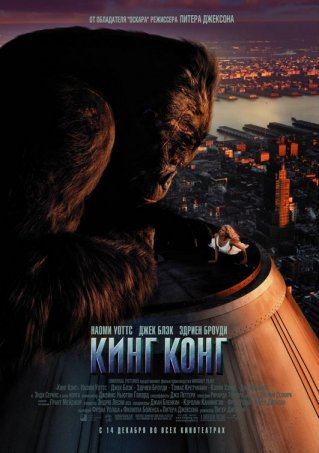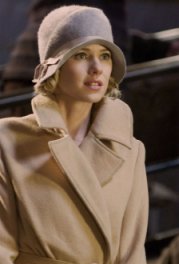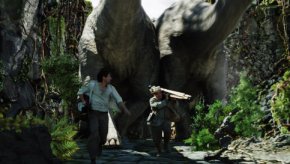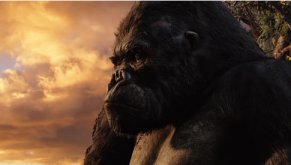|
King Kong
We stand by this rule: monkeys are funny. Sometimes they can
be touching and poignant as well. Keeping this in mind,
you might consider a twenty-five foot tall (at least) monkey
to be exponentially more entertaining than your standard-sized
monkey. At times, Peter Jackson's King Kong bears
out this theory, but then the Oscar-winning director has
to keep getting serious about what is, after all, a giant
monkey movie.
Sure, the 1932 original had its pathos
and its terrors, but it sought above all else to entertain.
Jackson's modern remake has that at its heart, too, but
somehow he managed to take the sleek classic and weigh it
down, almost doubling its length.
Unlike the 1976 version, this Kong
doesn't bother updating, instead keeping everything that
made the original work. At the height of the Great Depression,
filmmaker Carl Denham (Jack Black) needs an actress for
his latest picture - one that not even he quite understands.
He finds the starving actress Ann Darrow (Naomi Watts),
stealing an apple from a vendor on the streets of New York.
With
film crew and ship crew, they set out for the lost Skull
Island to capture the adventure of a lifetime. Of course,
what they get is…oh, dammit, get to the big ape already...
It takes Jackson at least forty minutes
to get there, and though lushly shot by Andrew Lesnie, this
first act drags. We're in an age where audiences apparently
need backstory completely spelled out, so screenwriters
Jackson, Phillippa Boyens and Fran Walsh take the time to
explain how both Darrow and Denham reached the state they're
in for their fateful meeting.
Casting Black alone should have been enough
to explain that Denham has charisma but is terribly annoying.
Nor should we see Ann have to sink to those depths of desperation;
it is, after all, the Great Depression.
The backstory does, however, provide Ann
with a link to the writer, Jack Driscoll (Adrien Brody).
Let us treasure a film that makes the writer the hero, adored
by young actresses desperate to speak his words. Thankfully,
the screenplay also acknowledges that Brody has a rather
offbeat look, especially when compared to the matinee idol
onboard, Bruce Baxter (Kyle Chandler).
Upping the intellectual content, the film
also throws in a subplot involving Joseph Conrad's Heart
of Darkness. The conceit feels a little too on the nose,
but though it goes nowhere, the diversion serves to keep
the crewmembers from being faceless as they get their faces
eaten by the terrors of the island.
Let us pause for a message from Fanboy
Planet Pimp Ass Editor Michael Goodson:
AAAAGGGGGHHHH!!!! SPIDERS! SPIDERS! SPIDERS!
Yes, everything that thrilled and terrified
audiences in 1932 has returned with a vengeance. Jackson
takes every classic Kong beat, feeds it steroids and then
turns it up to eleven, but convincingly so. Unlike the Jurassic
Park films, there is no time to ponder how this might
adapt to a videogame. You're too busy wondering how long
your pulse can pound like this.
Where Meriam C. Cooper's stop-motion Kong
battled a tyrannosaurus rex, the new King Kong (Andy Serkis)
has to battle three. In another part of the forest, we get
a full-on dinosaur stampede.
Then there's those creepy crawlies, an
incident teased and taunted in several other scenes as Jackson
lays out furtive glimpses of legs and claws. The original
spider sequence was deemed too horrific. Supposedly, audiences
of 2005 are made out of sterner stuff. Yet Jackson's take
is so disgusting you might just forget to breathe for the
duration of it. Worse, he stages it in almost complete silence,
which makes it one of the most uneasy (in a good way) sequences
on film this year.
In fact, Jackson dares let a lot of this
film go by without dialogue. It helps when your lead cannot
actually speak and is still so incredibly well-acted by
a brilliant physical performer like Serkis. The CG work
completely covers the man in the motion-capture suit, leaving
only the perfect illusion of a giant ape, albeit one in
love with a stunning blonde. (And that's strangely believable,
too.) King Kong is an outstanding achievement.
Serkis appears in a secondary role as the
ship's cook, and in both capacities seems remarkably restrained.
Despite the possible temptation, King Kong chews on giant
plants, not the scenery.
Most of the actors throw themselves into
a more evocative performance style. Though the screenplay
tries to give the characters historical realism, the acting
style has the earnestness of the thirties. Brody and Chandler
both have moments of old-time leading man charisma, and
Watts just seems born to the ephemeral glamour of the era.
Though an understandable choice, the casting
of Black seems a little off. Perhaps the actor is just too
closely tied to his persona. He tries to be calmer than
usual, but Jackson still elicits a manic edge from him that
was possibly meant to be intensity. Black also seems too
callow for the role; Denham is a weasel that has been around,
and despite some bags under his eyes, Black looks more like
a slacker barely pushed into adulthood.
The good outweighs the bad. The giant monkey
rocks, and even in an adventure story, Jackson understands
what scares people, but without pushing it too far.
(Sharp-eyed fans will spot the homage to Jackson's own zombie
film, Dead Alive.)
A satisfying
B-Movie, King Kong wants to be something more. Somebody
needs to remind Jackson that sometimes there's nothing wrong
with just making a damned good entertainment, especially
when you've got a giant monkey.
Rating: 
|









